CNBC Announces Participants For October 28th Debate
When CNBC first announced its criteria for the third Republican debate coming up on October 28th, there was some anticipation that it would result in a smaller contingent of candidates on the debate stage than we had seen in the first two debates. This was because the criteria required a candidate to average at least 2.5% in a select series of polls over the period starting from the day after the second debate until earlier this week. As I have noted in several of my posts about new polling over the past month, it appeared that at least two of the candidates that had been on the main stage in the first two debates might not make the cut this time, and thus be relegated to an undercard debate along with candidates garnering one percent or less in the polls. As it turns out, there will be almost no change in the participants over the past two main stage debates:
CNBC has finalized the lineup for next week’s GOP debate, the network announced Wednesday.
At center stage for the Oct. 28 primetime debate will be Donald Trump and Ben Carson, flanked by Marco Rubio, Carly Fiorina, Jeb Bush, Ted Cruz, Chris Christie, Mike Huckabee, John Kasich and Rand Paul.
The undercard debate will feature Bobby Jindal, Rick Santorum, George Pataki and Lindsey Graham.
Though CNBC had set a floor of a 2.5 percent average for the primetime debate stage, the final candidate lineup mirrors the previous GOP debate in California, save for Scott Walker, who dropped out of the race.
The only candidate who was at both of the previous main stage debates that won’t be there next week is Wisconsin Governor Scott Walker, who of course dropped out of the race in September. This is somewhat unfortunate because one of the flaws with the previous debates was the fact that there were so many candidates on the main stage that it was hard for anyone get it into real substantive discussions. Eight candidates would not have been entirely ideal either, of course, but it would have been somewhat better, especially given the fact that CNBC has agreed to the requests for format changes that will limit the total time for the debate to two hours. Additionally, an undercard debate that features Jindal, Santorum, Pataki, and Graham, seems utterly pointless.
In any case, it is what it is I suppose, and next Wednesday’s debate will be the first of two that will occur over two weeks. The second debate will be on Tuesday, November 10th in Milwaukee and broadcast on Fox Business Network. As far as I am aware, no criteria for participation for that debate have been announced yet.
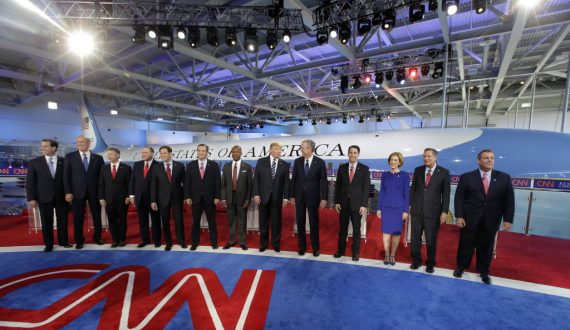

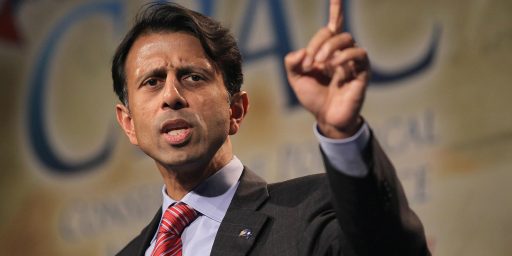
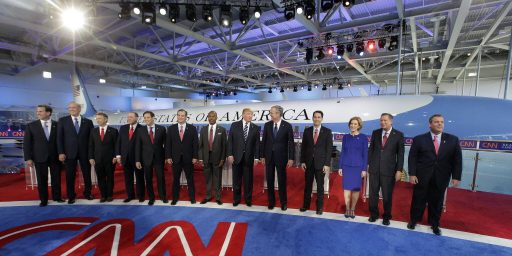
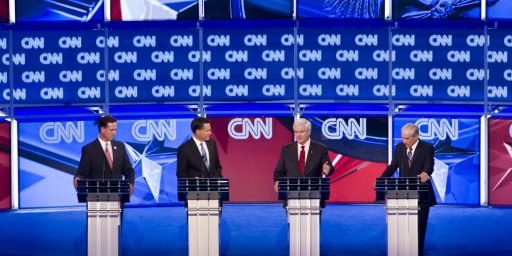
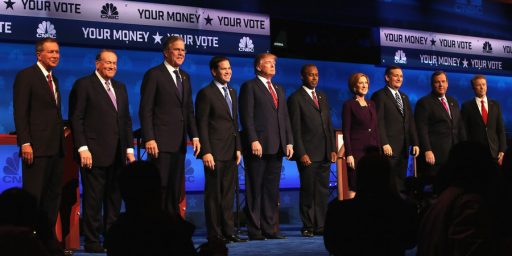
We’ve been winnowing for months now and there are still ten clowns in the center ring.
I figured some of these candidates would have thrown in the towel by now, but they keep treading water.
I think 10 candidates is too many and in a 2 hour debate even without commercials at most each candidate would only get about 12 minutes of time. That’s without commercials or accounting for the fact that some candidates will get more time than others.
My prediction is this debate will do little to change the current polling. The candidates will also say little that we haven’t already heard. 12 minutes of FaceTime will mostly just mean they hit the talking points with little substance.